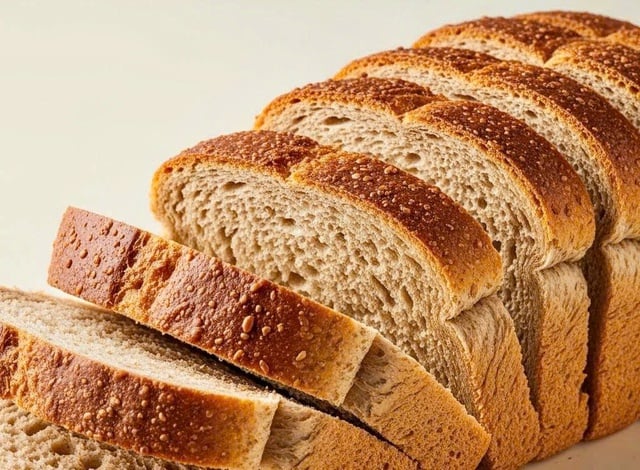So, is eating bread really good for you? And does eating bread every day have negative effects on your health?
As it turns out, bread can still be a household staple and can even help many people meet their nutritional goals. Bread can support heart and digestive health, and is a great source of energy during workouts, according to the health news site Eating Well.

Eating bread can help many people reach their nutritional goals.
Photo: AI
As nutritionists, we often recommend whole wheat bread because it often contains more fiber, aids digestion, and keeps you fuller for longer, explains Kristi Ruth, a registered dietitian based in the US.
Whole wheat bread contains fiber, protein and B vitamins essential for a healthy metabolism.
There are many health benefits of bread, including:
Provide all the nutrients the body needs
All types of bread are packed with nutrients like fiber, natural sugars, protein, B vitamins like thiamin, niacin and folate, as well as minerals like iron and zinc.
Support digestion
All types of bread, including white bread, contain fiber—an essential nutrient that has many health benefits, including aiding digestion, gut health, and even weight control. However, whole-wheat bread contains more fiber.
Prevent many chronic diseases
The high fiber content in bread helps reduce the risk of heart disease, stroke, type 2 diabetes and bowel cancer, making it an ideal way to improve health.
Is a source of Folate needed for pregnancy
White bread is also considered a significant source of folate, an essential nutrient during pregnancy.
Bread can be an important source of energy.
For those looking to fuel up during exercise, official guidance from the UK's National Health Service (NHS) also recommends bread.
The health body said bread was a "healthy choice as part of a balanced diet" and suggested wholemeal and rye breads were the best sources of energy.
The NHS states: White bread also contains a range of vitamins and minerals, but has less fibre than wholemeal or rye bread. If you like white bread, look for higher fibre options.

Whole wheat bread contains fiber, protein and B vitamins essential for a healthy metabolism.
Photo: AI
Support cardiovascular health
In its heart attack prevention guidelines, the NHS also recommends adding bread to the diet.
The agency says: Follow a Mediterranean diet. That means eating more wholemeal bread, rice, pasta, fruit, vegetables and fish.
A low-fat diet that includes plenty of fiber—such as wholegrain bread, pasta, and plenty of fruit and vegetables—has been shown to help lower blood pressure. Fruits and vegetables also contain essential vitamins and minerals that help keep the body healthy.
Who should be careful when eating bread?
Despite these positive points, nutritionists emphasize that carbohydrate-rich foods like bread also cause spikes in blood sugar levels. Therefore, diabetics need to be careful when eating bread.
In conclusion, the expert added that bread should not be considered a "harmful" food, according to Eating Well.
Instead, they should be viewed as a means of providing the body with essential nutrients and can be used in conjunction with healthy fats like avocado, or proteins like lean chicken and eggs.
Source: https://thanhnien.vn/an-banh-mi-hang-ngay-lieu-co-tot-185250719235941583.htm


































![[Photo] Worshiping the Tuyet Son statue - a nearly 400-year-old treasure at Keo Pagoda](/_next/image?url=https%3A%2F%2Fvphoto.vietnam.vn%2Fthumb%2F1200x675%2Fvietnam%2Fresource%2FIMAGE%2F2025%2F12%2F02%2F1764679323086_ndo_br_tempimageomw0hi-4884-jpg.webp&w=3840&q=75)
![[Photo] Parade to celebrate the 50th anniversary of Laos' National Day](/_next/image?url=https%3A%2F%2Fvphoto.vietnam.vn%2Fthumb%2F1200x675%2Fvietnam%2Fresource%2FIMAGE%2F2025%2F12%2F02%2F1764691918289_ndo_br_0-jpg.webp&w=3840&q=75)








































































Comment (0)